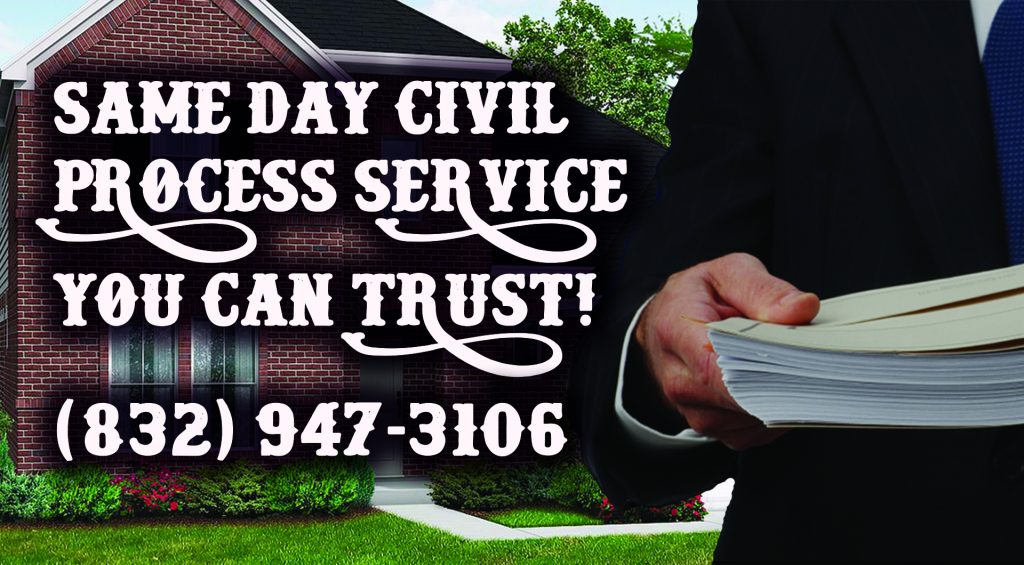Serving Court Documents in Houston: A Complete Guide on How to Serve Court Documents
Serving court documents is a vital step in initiating legal proceedings. Whether you’re filing a lawsuit, delivering a subpoena, or notifying a defendant, understanding how to serve court documents properly in Houston is essential. This guide offers expert tips for serving court documents, explains best practices, and shows why working with a certified process server ensures your documents are legally compliant and timely.
What Is Serving Court Documents?
Serving court documents refers to the legal process of delivering official paperwork—such as complaints, summons, subpoenas, or notices—to a person or entity named in a legal action. Under Texas law, proper service ensures due process for the recipient and gives courts jurisdiction over the case.
Why Proper Service Is Critical
Courts require documented proof that a defendant or respondent received legal notice. If documents are mishandled, delayed, or improperly served, your case can be dismissed or delayed. That’s why how to serve court documents correctly makes all the difference.
The Role of a Process Server in Houston
A certified process server, like Houston Process Servers, LLC, performs these duties:
-
Deliver court documents in person at home, work, or jail
-
Make multiple service attempts for evasive defendants
-
Offer stakeout services when needed
-
Send email updates after each attempt
-
Provide a notarized affidavit of service for court filings
How To Serve Court Documents in Houston, TX
When serving court documents in Houston, it’s essential to deliver legal papers personally and in compliance with Texas civil procedure. Using a certified legal document serving service, such as Houston Process Servers, ensures that documents are served properly, within deadlines, and with legally valid documentation to support your case.

Step-by-Step: How to Serve Court Documents in Houston
-
Prepare all legal documents, like summons and complaints
-
Hire a certified process server familiar with Houston and Harris County
-
Provide the recipient’s name, possible addresses, and any identifying details
-
The process server will attempt up to 4 deliveries at different times
-
Receive email updates after each attempt
-
Once the process service is complete, receive a notarized affidavit of service
Types of Service Methods
-
Personal Delivery: The most reliable method, typically required for civil actions
-
Alternative Service: Used if the recipient cannot be located, possibly via mail or posting on premises
-
Substituted Service: Serving someone else at the recipient’s residence (only when approved by the court)
Common Situations Requiring Document Service
-
Filing a lawsuit against an individual or company
-
Serving divorce, custody, or child support papers
-
Delivering subpoenas for witnesses or third parties
-
Serving notice of hearings or administrative proceedings

Frequently Asked Questions About Serving
What if the person avoids service?
Process servers can document evasive behavior and may request substitute service if required by law.
Can court documents be served at work?
Yes, as long as delivery to the person can be reasonably made and documented.
Do you have to serve documents via certified mail?
Certified mail can be used if courts allow it, but personal service is often preferred for speed and certainty.
How long does serving court documents usually take?
Usually, the standard service takes 5–7 business days; rush and same-day options are available for urgent situations.
Benefits of Hiring a Professional Process Server
-
Legal compliance with the Texas Rules of Civil Procedure
-
Reduced risk of invalid service
-
Greater flexibility and speed than law enforcement
-
Accurate documentation for court filings
-
Local expertise and knowledge of Houston neighborhoods
Table: Comparison of Service Methods
| Service Method | When to Use | Pros | Cons |
|---|---|---|---|
| Personal Delivery | Standard civil lawsuits | Most accepted, fastest | May require multiple attempts |
| Certified Mail | Allowed by the court or statute | Trackable, no in-person needed | Can be rejected or delayed |
| Substitute Service | After failed attempts with court approval | Court-approved alternative | Requires documentation process |
| Posting | Rare and only if the court explicitly allows | Last resort option | Less likely to prove actual notice |
Tips to Ensure Successful Service
-
Double-check spelling and addresses before service
-
Provide any work hours or secondary locations if known
-
Ask for photos or notes if allowed in the affidavit
-
Use a tracked delivery method when permissions allow
-
Keep communication with the process server open and active
Why Local Knowledge Matters in Houston
An experienced process server understands:
-
Busy neighborhoods and gated communities
-
Typical workday schedules versus weekends
-
Legal detention facilities like jails or institutions
-
Local courthouse procedures and filing expectations
Legal Requirements Under Texas Rules
Texas Rule of Civil Procedure requires:
-
Personal delivery in most civil cases
-
Affidavit of service filed with the court
-
Service by a disinterested third-party—often a licensed process server or law enforcement
-
Approval for substitute service, when applicable
Houston Process Servers, LLC is fully compliant with judicial certification, ensuring all service is legally recognized and properly documented.
When Not to Hire a Process Server
Although process servers serve court documents in many contexts, there are a few exceptions:
-
Eviction cases—handled by constables or sheriffs
-
Small claims court final notices—sometimes served differently
-
Other notices, like lien filings or administrative summons, depending on local requirements
If you’re unsure, consult your attorney or local court clerk to confirm whether a process server is appropriate for your case.
Call to Action
If you need reliable, court‑compliant service for legal documents in Houston, contact Houston Process Servers, LLC. We’re certified, experienced, and dedicated to serving your documents properly and promptly. Submit your request via our contact form. We’ll send a quote and begin the service process right away.

